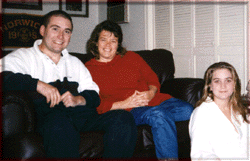![]()
 |
"Don't Be Afraid to Consider Bringing Your Loved One Home" |
When medical and safety issues are resolved, it's time to bring your loved one home. I was actually thankful that Jamey was immobile and quiet. It made the decision to bring him home very easy. For him, rehab wasn't really working, and even though he'd been given "carte blanche" to live at the Greenery for the rest of his life (thus relieving us of the burden of having to care for him at home), we were determined to bring him home anyway. We had also received a tidy settlement from our insurance company and felt certain that we could win an upcoming lawsuit.
Because Jamey started off in a post acute or step down rehab, we didn't have to worry about him being kicked out of an acute rehab because he wasn't making any progress. After we brought him home, we took him to the local acute rehab hospital for evaluation, and he was able to participate in outpatient therapies as well as in-home. We did PT and speech at the hospital and OT at home. As long as the patient is making progress, no matter how small, the therapies will continue.
However, as we all know, certain HMO's and Medicare are now paying for only 6 week programs of therapies, which should then be continued at home by a motivated family and patient trained in how to do them. Any further therapies are deemed appropriate after any kind of in-hospital stay such as orthopedic surgery.
Since we brought Jamey home I am a firm believer in bringing survivors of TBI home as soon as all the medical issues are resolved. I think they recover more quickly in their home surroundings and are better able to take advantage of the therapies in their homes with their families around to cheer them on. Then I believe that later on there is a great need for cognitive and recreational therapies that can be offered in day programs, which right now do not exist in abundance as they should. This is where more progress needs to be made in the future.
Six years ago when Jamey suffered his TBI, rehabilitation was big business. Most families thought that it was important to do everything they could to make sure that their loved ones stayed in rehab hospitals. When the dreaded 90 days was up, everyone was scrambling to get on Medicaid. No one could imagine ever bringing their loved one home -- at least until they were "cured" anyway. When we realized that Jamey was never going to be "cured" in that place, at the next family meeting, we told everyone that we planned to bring Jamey home. I can remember the looks of amazement on their faces.
What I hope to see in the future is more support systems in the community to where Medicaid will encourage people to go home or to support apartment complexes with 24 hour care as they do here in the state of NH. I want to see states supporting programs for TBI as they do for the mentally ill, the developmentally delayed, and the elderly. I don't think we need the institutions at all!
 |
Jamey, Martha and Jessica, Fall 1996.
|
Attorney Gordon S. Johnson, Jr.
E-mail to: waiting.com
For legal questions call toll free:
1-800-992-9447
copyright ©2002 - 2013 Attorney Gordon S. Johnson, Jr., All rights reserved. For more on Attorney Gordon Johnson
http://gordonjohnson.com